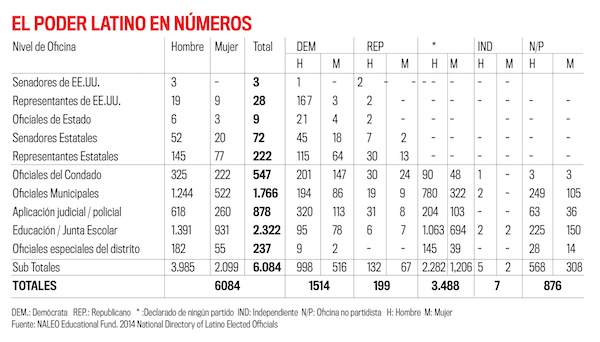
The scope of the Latino vote: a perspective for 2018
Despite being the largest minority in the United States, Latinos continue to have less representation in government agencies. This reality could change in 2018…
During the last 12 months we have seen how the stigmatization of the Hispanic community in the United States has become the bread and butter of everyday life.
The internal persecutions, threats against the sanctuary cities, the increase of the raids or the suspension of the DACA and the TPS for Central American citizens have been just the tip of the iceberg in the immigration policies of an administration that insists on making the immigrant its scapegoat.
This reality supposes not only the radicalization of racist and xenophobic positions on the part of those who now lead the country, but also the need to analyze the participation of the Latino community in national politics.
At the end of 2016, the Latin American population in the United States was represented by only 1% of the elected officials, despite being the fastest growing community in the entire national territory (without taking into account the Puerto Rican population).
According to data from the National Association of Latino Elected Officials (NALEO), currently around 6,100 Latinos have been elected to represent their communities in legislative and governmental bodies, at municipal, state and national levels, and their conglomerate is structured "from the base upwards", as the editor of the PODER magazine, José Fernando López, explained in his column for the Huffington Post some years ago.

While this growth seems to have a solid base, phenomena such as the results of the 2016 presidential election call for a more objective debate.
RELATED CONTENT
According to figures from the Pew Research Center, 66% of registered voters who identified themselves as Latinos supported the candidacy of Hillary Clinton, versus 24% who supported the then-candidate Donald Trump. However, the Democratic candidate did not get the same support from the Latino community that her predecessor Barack Obama had, who during 2008 received the support of 67% of Latinos, while in 2012, that figure increased to 71%.
Also, during the Obama era, some Latino elected officials tried to distance themselves from the Democratic trenches and plotted a different trajectory, as was the case of Jaime Herrera Butler in Washington and Raúl Labrador in Idaho, whom López describes as "Republicans who have assimilated the culture in a different way to the Hispanic community", like the Marco Rubio phenomenon, who managed to put himself at the head of the GOP with more conservative strategies.
But the scenario in 2018 is different.
The Latin American community urgently needs leaders who not only represent the ideals of a party that supports them, but identify the needs of the communities that will ultimately choose them, promoting the heterogeneity of the American social fabric not as a political element, but as an unavoidable reality.
The duty of our political leaders is to defend our rights as citizens in the country, but the challenge lies in defining the strategies.
An important part of the American population echoes the postulates of Samuel Huntington (whose book The Clash of Civilizations and the Reconfiguration of the World Order seems to be the Bible of the Trump Administration) about divisiveness and the danger posed by the increase in Hispanic population in the country; the new political perspective needs precisely to deny that, to demonstrate that the immigrant culture has nothing to colonize, and to finally throw overboard so many years of stigmatization in order to really approach the American Dream.











LEAVE A COMMENT: